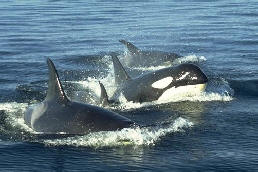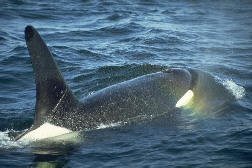|
SEATTLE, Washington,
19th December, 2002 (ENS)
A coalition of conservation groups filed suit
Wednesday seeking protective status for the
last population of resident killer whales in the
continental United States.
The suit against the National Marine Fisheries Service (NMFS) seeks to force a reversal of the Bush administration's decision not to protect Puget Sound's resident orca whales under the Endangered Species Act, even after finding they are in danger of going extinct.
The coalition charges that NMFS decided against extending federal protection to the orcas because they decided it would not be a "significant loss" if orca whales no longer resided in Puget Sound.
In May 2001, the Center for Biological Diversity and 11 co-petitioners filed a petition to list this orca group as endangered under the Endangered Species Act. NMFS reviewed the petition and on July 1, 2002 determined that this population of orcas was indeed a discrete population. NMFS also found that they were in danger of extinction.
However, the agency determined that the whales didn't meet a third criterion - that the whales are "significant."
"This is the first time an agency has tried to avoid protecting a species by claiming that the species is insignificant," said Kathy Fletcher, executive director of People for Puget Sound. "If the Bush administration could get past its scorn for environmental protections, it would realize that saving the Southern Residents is not only good for our ecology, but also Puget Sound's economy."
The lawsuit was filed by Earthjustice and the Center for Biological Diversity, Ocean Advocates, Orca Conservancy, Friends of the San Juans, People for Puget Sound, former Secretary of State Ralph Munro, Karen Munro, and the Earth Island Institute.
The lawsuit alleges several violations of federal environmental law, charging that NMFS ignored several important aspects of killer whale biology and culture during its deliberations, including the fact that the Puget Sound resident orcas maintain a unique culture and that the extinction of the these orcas would result in the localized extinction of resident killer whales in the continental United States.
Over the past six years, Puget Sound's resident
killer whales have declined by almost 20 percent,
leaving just 78 individuals in the population at the
end of the 2001 survey year. The cause of the
current decline appears to be the combined effects of
high levels of bioaccumulative toxins, a population
decline in their preferred salmon prey,
and human disturbance from vessel traffic and noise.
"You can't save these whales without protecting their habitat and prey from oil, PCB, and noise pollution," said Fred Felleman of Ocean Advocates. "None of our conservation laws protect habitat as effectively and as flexibly as the ESA, but we must look to the courts to counter the Bush administration's opposition to effectively enhancing the welfare of Washington's waters."
"In the end history will judge us by what we did to preserve the diversity and sanctity of life in our corner of the world," added Earthjustice attorney Patti Goldman. "We take this stand today to make sure this unique population of killer whales will still inhabit Puget Sound into the future."
Top
|

